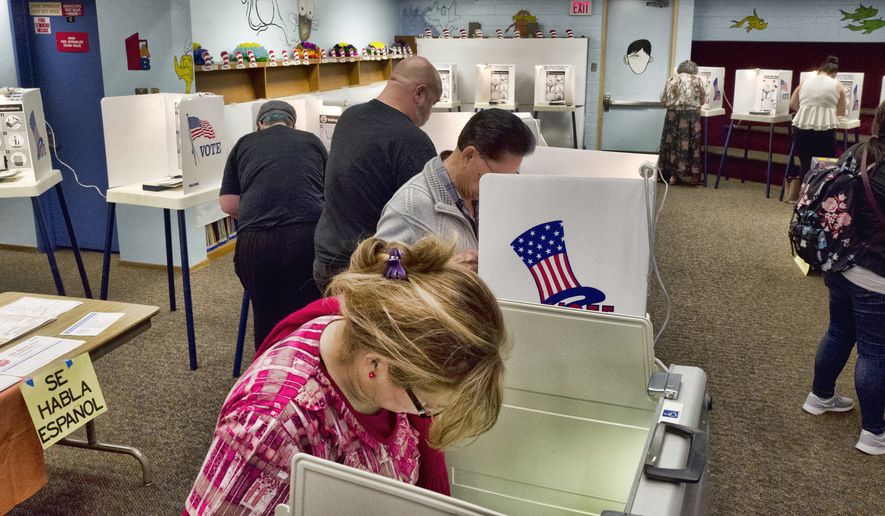Los Angeles County has agreed to conduct a purge of its voting rolls, in a move that could strip perhaps 1.5 million inactive voters from the lists of those eligible to cast ballots.
The county made the deal in a settlement last week with Judicial Watch, a conservative public interest firm, saying that under a recent Supreme Court ruling, it has a duty to remove names of people who appear to have either died, moved from the county or lost interest in voting.
The county committed to mailing hundreds of thousands of voters already deemed inactive to see whether they are still eligible voters, and to removing names of people who don’t respond to notices and who miss two subsequent federal elections. The county also agreed to try to weed out dead people still on the rolls.
California Secretary of State Alex Padilla, who was also part of the settlement, committed to send notices to all registrars informing them that they, too, must take steps to cancel voters who miss voting in repeated elections and fail to respond to follow-up notices.
Judicial Watch called the settlement, involving both the nation’s biggest state and the biggest county, a significant win for conservatives who have been trying to harness the 1993 National Voter Registration Act, better known as “Motor-Voter,” to try to clean up voter rolls even as Democrats use the law to expand voter access.
“This is a major NVRA victory — probably the biggest in the history,” said Robert Popper, the Judicial Watch lawyer who fought the case.
He said he expects most of the more than 1.5 million names on the county’s inactive voter list will end up being removed.
Mr. Padilla, the secretary of state, disputed Judicial Watch’s claims, saying he didn’t agree to specifically kick anyone off the rolls.
“The settlement is clear and simple, California will continue its work to adhere to modern list maintenance procedures under the NVRA,” he said in a statement. “This settlement will not lead to unnecessary removal of active and eligible voters. Safeguards remain in place to ensure voter list maintenance procedures are followed before canceling any voter registration records.”
Neither the Los Angeles registrar nor the county’s counsel returned messages Monday seeking comment. Neither did the League of Women Voters or Mia Familia, both of which sought unsuccessfully to intervene in the case earlier.
On Tuesday, however, the registrar finally responded, providing a statement saying last year’s Supreme Court ruling undercut his defense.
Registrar Dean C. Logan still said he’s confident voters won’t be wrongly kicked off the rolls because of the settlement.
“We have simply agreed to comply with the NVRA as interpreted by the Supreme Court and nothing in the agreement will jeopardize even one eligible Los Angeles County voter,” he said.
California becomes the third state to reach a settlement. Ohio reached one in 2014 and Kentucky entered into a court-imposed consent decree with Judicial Watch over its voter rolls last year.
Mr. Popper said the motor-voter law was a compromise. It boosted voter participation by requiring states to register voters at public offices such as motor vehicle bureaus, but it also encouraged states to keep their lists clean by removing outdated names in order to tamp down on the chances of fraud.
Democrats have chiefly focused on the expansion of registration, while battling against efforts to clean the rolls.
One example of that, according to Mr. Popper, was a 1998 decision by the Clinton Justice Department instructing California not to remove people identified as being inactive voters because they failed to respond to follow-up communications.
Other states have made similar arguments.
But the Supreme Court, in a major 5-4 ruling last year, said states can use non-responses as part of their justification for cleansing rolls — and that people who have been notified and missed two subsequent federal elections must go.
“Not only are states allowed to remove registrants who satisfy these requirements, but federal law makes this removal mandatory,” the majority ruled.
The new agreement reached last week highlighted that part of the ruling, which appeared to undercut Los Angeles’s legal position and leave the county with little choice but to settle.
Judicial Watch said it targeted Los Angeles after finding the county’s total voter population was higher than the number of people the Census Bureau estimates to be citizens of voting age in the county. That’s true for the state overall, which Judicial Watch said has a 101 percent registration rate for its eligible adult population.
Mr. Popper said while much of the national debate about voter fraud is on in-person abuses, the bigger problem is fraudulent double-voting, which can happen if someone is still getting a ballot or registered at their old residence, while also being registered and voting at their new home.
He said Los Angeles’s inactive voter file is a major potential source for mischief.
Contrary to the impression left by several media fact-checkers, “inactive” voters in California are able to cast a legal regular ballot. The difference between them and active voters is that those on the inactive list don’t get regular communications such as sample ballots from elections officials.
Last week’s settlement agreement is just one of the battlegrounds over voting rights to emerge in recent years.
Democrats won control of the House in the midterm elections in part on a campaign arguing that Republicans were suppressing the votes of racial and ethnic minorities and poor people. They have vowed action to expand voter access and curtail voter integrity checks.
H.R.1, Democrats’ first marquee bill, would require states to allow same-day and internet registration. It would also amend motor-voter to overturn last year’s Supreme Court decision, eliminating the ability of states to remove people for failing to vote or respond to follow-up notices.
• Stephen Dinan can be reached at sdinan@washingtontimes.com.




Please read our comment policy before commenting.